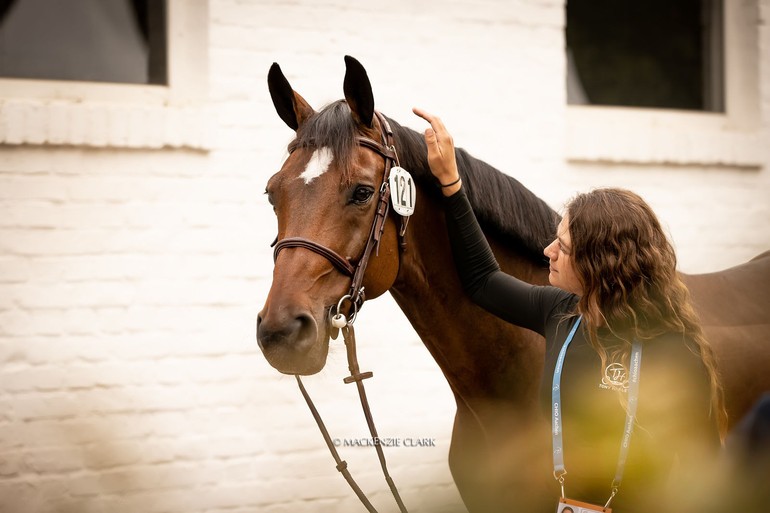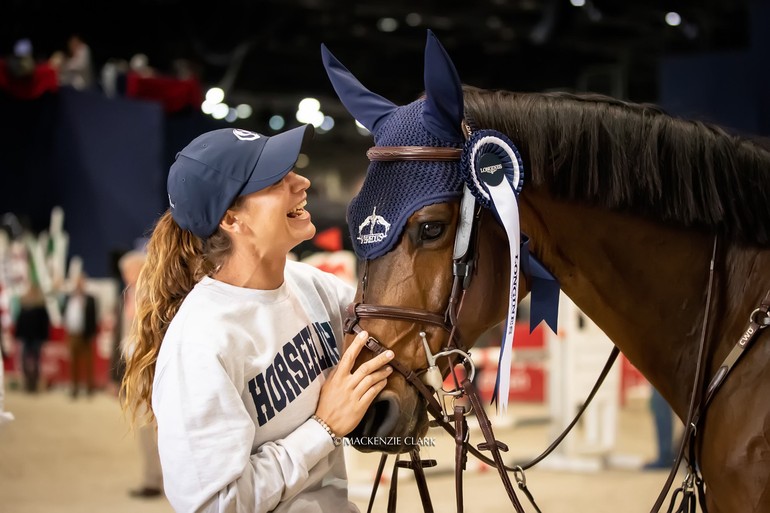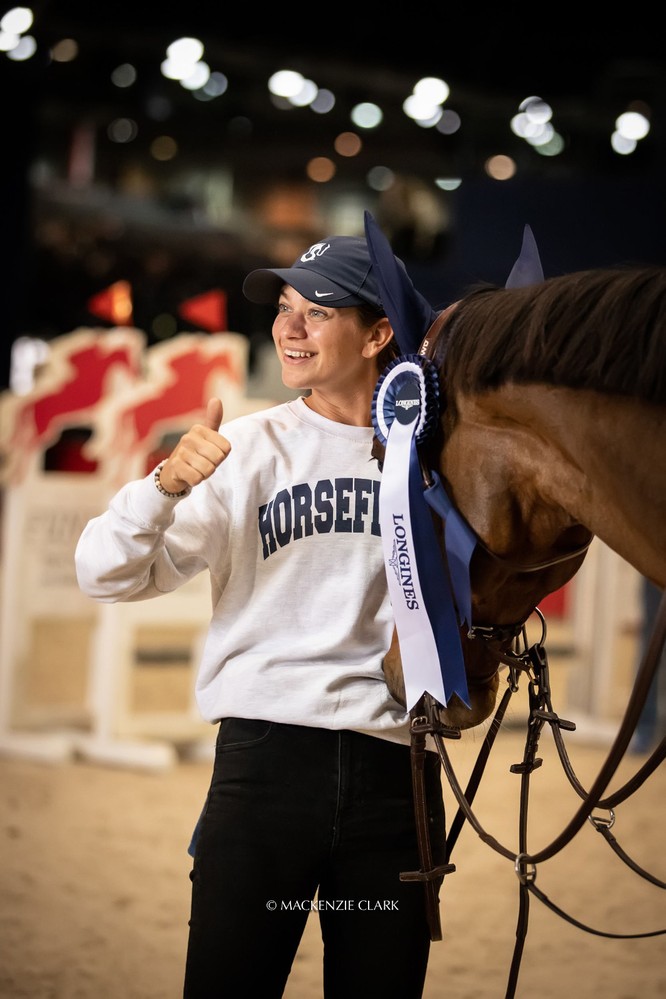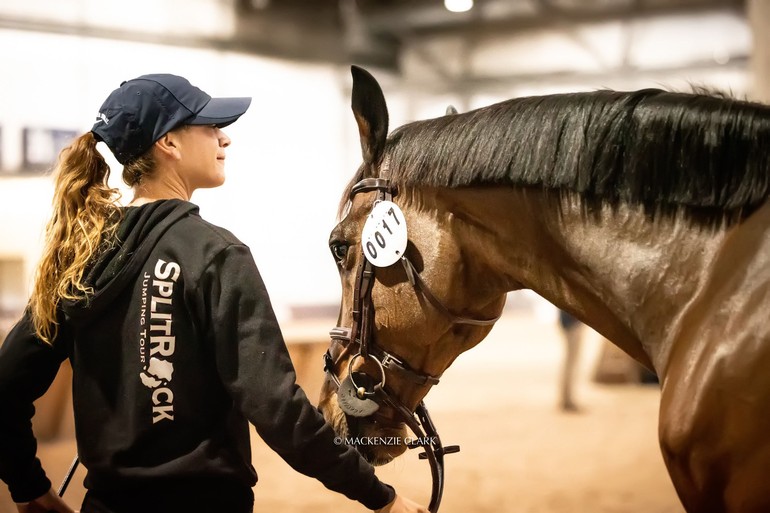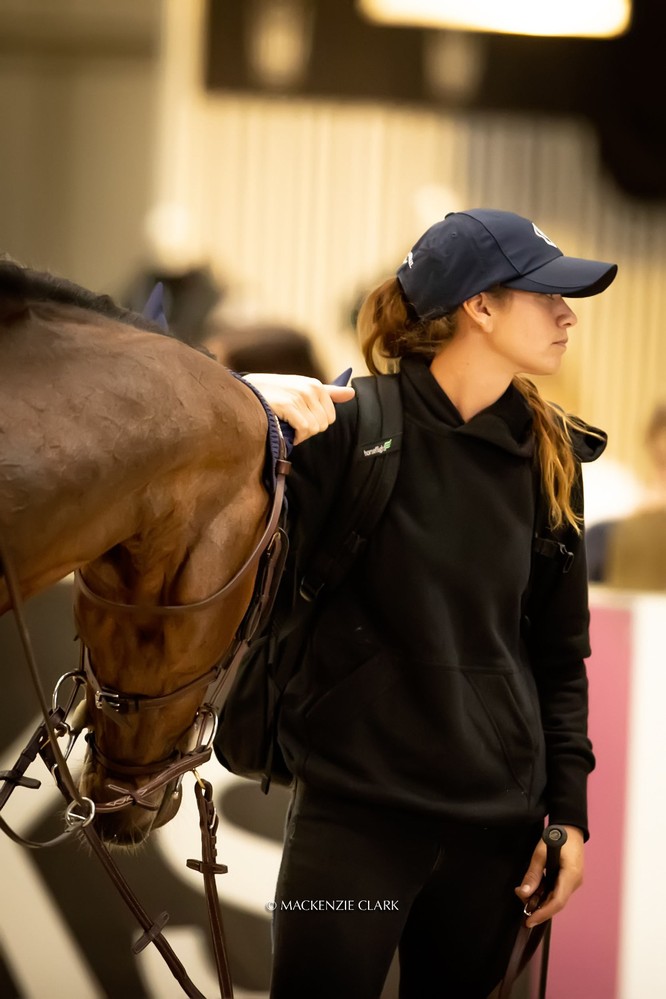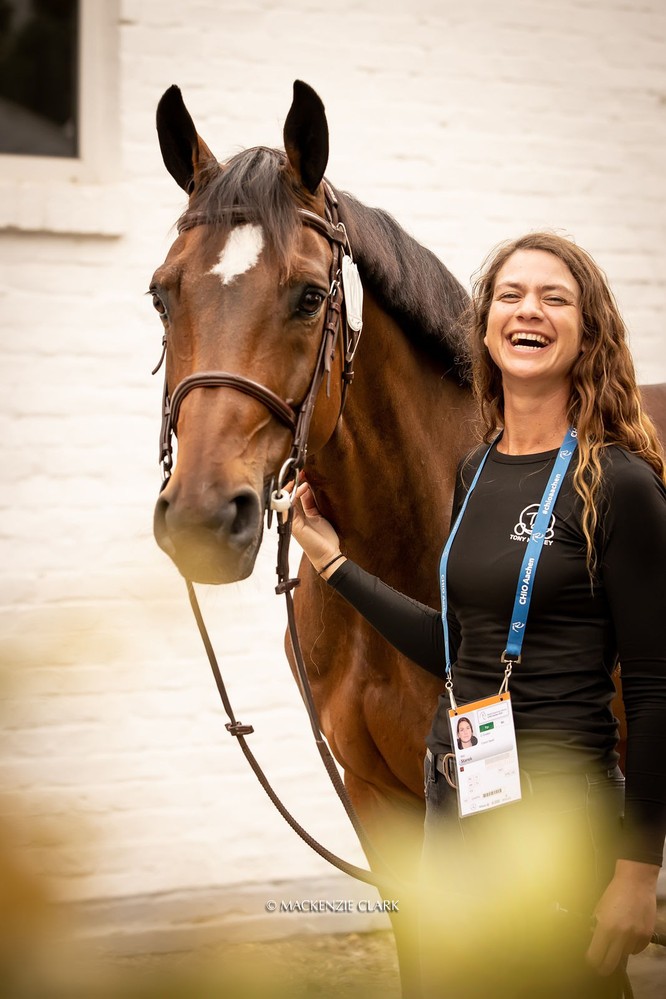Text © World of Showjumping
“I feel blessed and lucky to have gotten into it,” 35-year-old Jessica Stanek says about the equestrian industry – and the showjumping community in particular, where she has worked as a groom for over a decade. “Even if I maybe won’t groom forever, I will find something in the industry; I know 100% that I want to stay in it. There are so many possibilities – if your mind is open.”
“I love the sport; my favourite part is showjumping – I would not want to do anything else,” Stanek continues. “Working with horses is a passion, we don’t do this for the money. If you are in this sport for passion, you will find a way to make money; if you are in this for money, it is never going to work. Even though there are some negative aspects to the job, we do have a fantastic community. If you think about what we get to do, how much we see the world on our travels, the amount of people we meet and the knowledge we can gain from those we meet along the way; it is such a privilege and I think many forget that.”
For the love of the horse
“I started as I guess so many others did; I wanted to ride, and my thought about it was – as I don’t come from money – to start with grooming,” Stanek tells about the beginning of her career. “However, as the years went by, I realized I was actually more passionate about the grooming aspect of the sport. I love the horses, and for me it is just as important to groom as it is to ride and I prefer to care for the animal. As we all know, grooms play a very important role, from the bottom level to the top; the care of the horse is essential.”
Grooms play a very important role, from the bottom level to the top; the care of the horse is essential
Stanek’s parents were into horses; her father used to do race horses and her mother did dressage, so she grew up riding. As a 21-year-old, Stanek took her first grooming job in North Carolina with Harold Chopping, and after four years, moved on to Pablo Barrios’ barn as she wanted to do more. “I worked there for four years, until Pablo stopped doing the bigger shows,” Stanek explains. “I learned so much from him and his vet Dr. Gomez. Those two are the ones that have taught me the most in the industry. Also, I still own Antares, a horse Pablo took to the World Equestrian Games in Normandy. After Antares got injured, I asked Pablo if I could have him and my little sister rides him now. He is the cutest horse ever and means so much to me because he was my first for everything; with him, I did my first Pan American Games, my first World Equestrian Games. When Pablo stopped competing on the higher level, he kind of passed me on to Daniel Bluman, who is a good friend of his. I worked for Daniel for almost four years, and then helped Conor Swail for two years. Now, I am a stable manager for Ansgar Holtgers Jr. at Gut Einhaus.”
“I would have to say that my favourite part of the job is the success!” Stanek laughs. “I am all for winning. Being in Dublin with Conor when we won the Nations Cup last year was amazing. I was lucky enough to help him for the last two years, and it was a wild ride. It was the right place at the right time, but there were many hours put in and I would spend my days off on the plane between the States and Europe… But I would not change a thing, it was great. With Daniel, another incredible moment was when we qualified for the Olympics in 2019. The feelings I got out of moments like those is the best part of it all.”
Focus on the positives
While the grooms play an essential role in the sport, Stanek calls for a more equal approach as well as more positivity instead of only highlighting the problems. “In my opinion, the role of the grooms is essential to the sport, but I wouldn’t say the grooms are the backbone,” she points out. “I think the riders are just as important, as is everyone else that is involved: Everyone involved in the sport is putting in the same amounts of hours – from the vets to the riders to the grooms, and some seem to forget that.”
We should focus on how grooming is the starting point
“I do think the grooms are an asset to the industry and that is why we need to figure out a better way of getting people in who are passionate about the sport. Instead of highlighting the negative aspects of the job, we should focus on how grooming is the starting point; if you don’t want to groom forever, that is ok, but you can learn to be one of the best, learn horsemanship and then you can work in many other avenues of the industry. We have to focus on the positives; that is what we need to change,” Stanek says.
Cut the drama
According to Stanek, the most demanding part about the job is not the grooming itself or any of the physical work, but the mental state others can push you to. “I have never in my life felt underappreciated by any rider I have worked for, but more so by other grooms – or even officials,” Stanek says. "That is the hardest part about it all; other people.”
We have to be fair and positive
“A really unhealthy dynamic can sometimes be present within the grooming profession,” she continues. “There can be a pettiness, or even an undercurrent of nastiness, displayed by some colleagues. It can sometimes be really challenging to deal with. The community of grooms can feel like being in high school, and an environment like that is not going to pull more people in. There are too many grooms with high egos, and the way they speak about new people coming in can be horrendous. Of course, those that are new to it could at many times be better but they just started; we have to be fair and positive in order to keep them in the industry."
More education
Stanek believes that the current lack of grooms comes down to how those that are new to it are introduced to the industry, and that there is not sufficient education. “There should be an intern-system, where new grooms get to learn about every aspect of the sport so that they have a decent level of knowledge before they are thrown into it,” she says. "We hire them with no knowledge and the expectation to help us with five or six horses; we don’t give them a fair shot. Of course, when you get people with the wrong attitude grooming with you, it is a struggle; even if you might have five people on your team it is often still a one man show and that makes the job a lot harder. Another issue is that it sometimes seems like the riders forget what grooms do and keep putting too much on one person. At the end of the day, putting too much pressure on people is driving the work force out.”
We need to focus on the importance of the job and why we should be putting those hours in
“In my opinion, we have to create an encouraging environment for learning,” Stanek continues. “When I have new people coming in, I make it a point to teach them and give them the reasoning on why we do what we do – and that it might not be the only way. It does not make sense to me to turn the barn into a factory, to just say ‘these horses eat this and this’ – I want to know why everything is done, I need a reason for why I am doing something, and I believe it is the same for everyone else. You need to know what you are doing and, more importantly, why. I think if we educate from this standpoint rather than grooms being the backbone of the industry, we will be better off. We need to focus on the importance of the job and why we should be putting those hours in – not why we should be taking time off.”
“Another issue is that there are so many young riders coming into the sport as well who have never been taught horsemanship and then they have grooms working for them who have no idea too. If we continue in this direction, all horsemanship will be lost,” Stanek points out. “The grooms coming in are often very young, and some of us – including myself – are hard on them.”
Know your why
While the lack of education can lead to extinction of horsemanship, not understanding why you do what you do can also cause issues with motivation. “We have these young kids coming in that do this for a few years but in the end don’t understand why they are doing any of the things they are doing,” Stanek explains. “They bandage the horses’ legs because someone told them to do so; they feed the horses as they were told, but all this without truly understanding the logic in what they are doing. And then they wake up in five years, feeling like they have wasted years of their life for these riders, because they don’t understand the importance of their job. I think that is why there are complaints about the hours and complaints about the pay; these people don’t realize what their job entails, there is this huge lack of understanding the bigger picture. To be motivated means that you have to be openminded and curious, and know your why.”
To be motivated means that you have to be openminded and curious
“However, the downside of being passionate is that we as grooms easily drive ourselves too far and work too much, but this is where I believe the riders should stand up for their staff,” Stanek points out. “Riders and team managers have to make sure that everyone takes their time off and gets a break when needed. This is where the event organizers play a big role as well; they do have to take the grooms into consideration when planning their schedules and not run too many classes back-to-back, or too late.”
“We have to be mindful of what we are promoting in the media and on social media as well,” Stanek concludes. “If we only focus on the negative, it is going into people’s minds and drive the good people – those who do this for passion and don’t come from money – away and the people who are in this sport for the wrong reasons just feed off attention like that. We need to figure out a way to bring more passionate people in, and be more positive in general – because it is nevertheless a great community that we have. There are endless opportunities within our industry; we just have to be open to see and seize them.”
8.3.2023 No reproduction of any of the content in this article will be accepted without a written permission, all rights reserved © World of Showjumping.com. If copyright violations occur, a penalty fee will apply.



